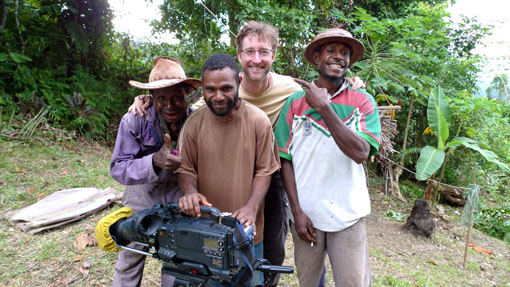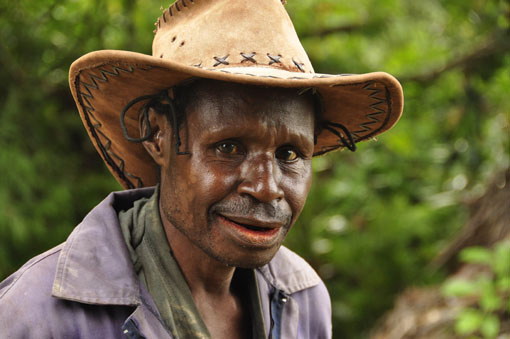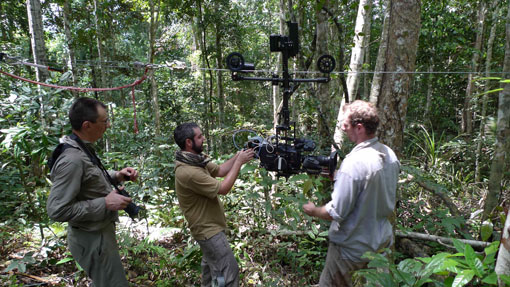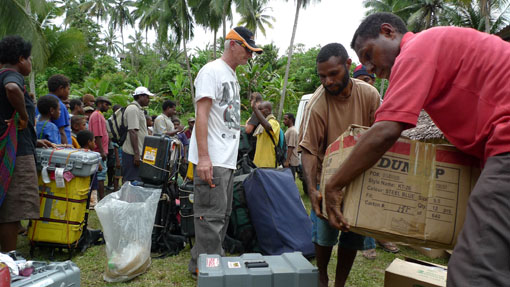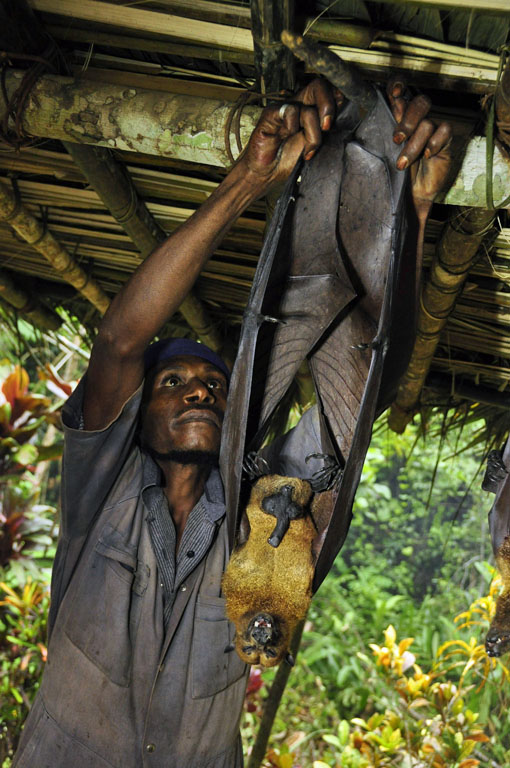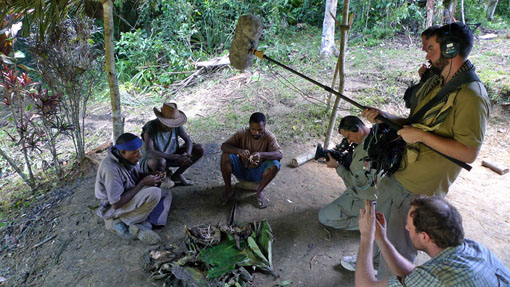Papua New Guinea - Wild Frontier
By Nicolas Brown, Producer/Director, Arctic and Mountains Team
Papua New Guinea has the feel of the Wild West. Because it’s a mountainous tropical island it doesn’t physically resemble a Spaghetti Western, but the larger than life characters and the ever-present threat of violence make it a frontier. This could be a set for Clint Eastwood- with a pierced nose.
As our small airplane nears its destination—Wewak town- we fly over the mighty Sepik River. Braided into a wide Delta of graceful interlocking ox bows, this is how rivers used to look hundreds of years ago. No channels or dams or bridges. The wildness is just a taste of what is around the corner.
On our descent, we are treated to a breathtaking overview. Wewak town is in the shadow of Mt. Turu, a 1600-metre high peak covered in dense jungle. But the real story—the one we have come to film—lies beneath the canopy, where literally hundreds of tribes make their living on the steep mountain slopes. My burning question is—exactly who have we come all this way to film?
In Papua New Guinea there are over 700 distinct tribes, in the East Sepik province (which is half the size of Ireland) there are 88 distinct languages spoken. Around this one single mountain- Mt. Turu- we counted 7 different ethnic groups. In terms of people, this place is wildly diverse.
This is the home of cannibalism and many say there are still tribes in the mountains that cannibalise each other. As recently the 1970s, four Dutch families were killed and eaten. Two years after that a priest and his 12 companions were killed.
Possibly more worrying for a BBC film crew, Wewak is famous for cargo cults. Prior to this trip, I had never heard of such a thing, but evidently during WWII the Japanese and Americans flew a lot of supplies—cargo- to the region. Once the war ended, the cargo stopped coming. In an attempt to get it back, local tribes evolved religious rituals that mimicked the activities of soldiers, such as wearing “headphones” made of wood and speaking into “radios” woven out of straw. You’d think they would have got tired of waiting for cargo by now, but evidently not.
When I suggested our original plan to fly to our location using helicopters, the image of us arriving from the sky with dozens of boxes of film equipment filled our local fixer with dread. “Are you crazy? You cannot come out of the sky carrying boxes of what looks like cargo—that would cause big trouble.” But, as we are about to find out, “big trouble” is coming anyway, in a different guise.
It starts on our first day. We had just loaded the vehicles with our filming equipment when the hotel owner enters and announces that a week ago, there was a jail-break in Port Moresby’ maximum security prison. Twelve of the most notorious criminals in PNG had escaped, including the most notorious of all—William Kapris. The hotel owner goes on to say that someone has just hijacked a 4×4 vehicle earlier this morning. Since William Kapris grew up near Wewak, the inference is that Kapris is back and is collecting 4x4s to escape into the mountains.
Two of the best 4×4 vehicles in town are ours- parked in front of the hotel, full of our gear. We debate our options. Some are suggesting that a BBC film crew would make a useful bargaining tool for a desperate criminal gang. Do we keep filming? Or do we hide in the hotel and watch the armed guards patrol the perimeter, while we put our feet up and drink beer? The decision falls to me.
I look at the sky which is moody and dark—this is the rainy season, and if we don’t leave now there’s a real chance that the roads will get so muddy that we will never reach our location. So I say, “let’s go filming, but keep our eyes and ears open.”
Of course, the minute we leave the hotel, everyone is a suspect. That man by the hedge—does he look like a mass murderer? That boy playing with his football against the wall—is he going to phone Kapris and tell him the 4x4s are on the way? On the road, the woman with her bag of vegetables—I imagine she is William’s sister who eventually liaises with the international hostage negotiators, saying “Don’t you think a BBC Producer’s life is worth a little more money than that? Pay up.”
Our visit to the local police is not encouraging. The Commander in Chief sees the BBC coming, and seizes a press opportunity. “Everything is under control—we have shoot to kill orders, and we are sure that we will find him and he will die.” I wanted to tell him, “We don’t care if you catch Kapris or not—we just don’t want us to be shot in some kind of crossfire confusion,” but I bit my lip.
We drive to our location without incident. At the village we are welcomed by the elders, and by our fascinating hero, Marcus. Marcus is a Yangoru Boiken hunter, but to the locals, he is a man feared for his magic powers.
To get our gear out to Marcus’ hunting grounds requires 40 some porters. So the whole village it seems comes under our employ. Our fixer AJ, who has done this before, makes a clear list of everyone’s names, and what we will pay them. And we set off.
On the way we are told never to stray from the path—not even to pee. Evidently, people from rival tribes will hide in the bushes, and then will leap out and stab you with a syringe filled with the poison of the giant centipedes that live here. Apparently it’s a very painful death.
Why someone would want to randomly murder you is not made clear. When I ask, the only answer that comes back is “witchcraft”. In the end I conclude that it is an effective way of controlling us—like telling children ghost stories so they don’t go wandering off at night.
We eventually film our sequence—which is a wonderful gothic tale that has never been filmed before. Marcus and his fellow hunters try to catch the giant fruit bats that fly over the canopy in the dead of night. How they catch them is ingenious and you can find out the whole story when you watch the mountains episode of Human Planet. 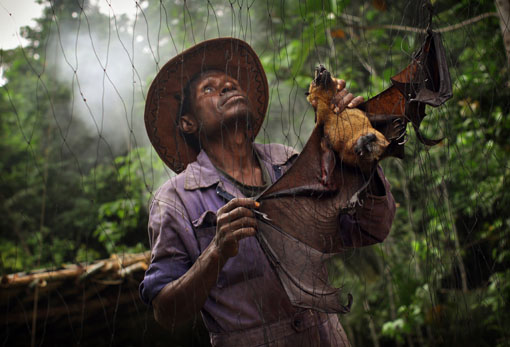
- Marcus capturing a bat in the net
We get to a point in the filming where we need to move locations to a different gap. It means a change in location, and a change in porters. So we are paying the porters and the trouble starts. Most people understand that in order to get paid, they need to have put their names on a list when they carried a load for us. But a few shifty looking men (who none of us had ever seen before) declare that they had worked for us but their names weren’t on the list. It gets heated. People are slamming fists, arguing with each other and with us. I can see the violence escalating.
So we decide to pay everyone double. And leave quickly. This puts a huge hole in our finances, but at least no-one has been hurt.
At our new location, there are more fees to be negotiated with the landowner. And we’re low on cash. But we make a deal, and begin filming. Then after about half a day, a man comes crashing through the jungle with a few henchmen wielding machetes. He declares that we are on his land, and he needs payment, or he will take action.
We explain that we have a deal in place with one person who owns the land. So who is this new guy? He says, “I am Joseph, tribal chief and the elder brother of the landowner.” Which makes Joseph a more senior landowner. And Joseph wasn’t informed about our project, which is against the tribal law. We immediately halt filming. We are back at the negotiating table.
Joseph has a remarkable command of legal sounding phrases, like “grievance” and “landowner rights”. And he wants money—a lot of it. And if we go home now, we can’t finish the film. Joseph seems to know this—he has a highly intuitive grasp of the art of blackmail.
Throughout the negotiations, I wryly note that Joseph’s younger brother—who we made a deal with in the first place—keeps schtum. He sees the possibility of more money coming his way, however indirectly. We are stuck, without enough cash to pay up, and with a half shot film.
Then, a few of our porters come over with a suggestion. They don’t like the blackmail that is going on, and they’ve never liked Joseph. He does this sort of thing all the time, and keeps all the money to himself. So they helpfully offer to get Joseph “drunk.”
“Oh that’s a nice gesture,” I say, “but it won’t really solve this predicament, will it?” They go on to explain that “getting someone drunk” is a euphemism for taking them into the woods and chopping them into bits with machetes. I can’t contain my horror—“Lord, no, don’t get him drunk! I don’t like the old codger, but that’s going way too far!”
In the end we compromise on a reduced fee for Joseph that pretty much ensures our “end of filming celebration” will be us drinking a round of tap water in the airport lounge. And Joseph is so pleased that he managed to squeeze more money from us that he invites a bunch of his friends to come watch us film. Every time he catches my eye, I wince, and it amuses him immensely. But we get the job done.
On our return journey I catch wind of a radio programme. It’s an English language call in show, and a voice speaks to the host. “This is William Kapris.” I am stunned by the meekness in his voice. To this day, I have no idea if this is a true story or just a prank, but the man claiming to be Kapris explains that the whole jail- break was organised by the government so that they could execute him on sight. It seems he knew some things about high-ranking officials that they didn’t want to come out in his trial. Now he’s on the run—maybe in Wewak—wanted dead or alive.
Like I said, Papua New Guinea is a bit of a frontier, and Wewak town belongs in the Wild West. Kapris is Jesse James. Joseph is Billy the Kid. And we are just a bunch of Westerners whose pockets were easily emptied.
